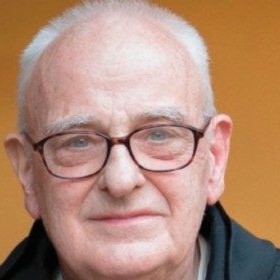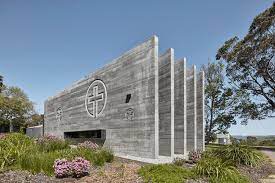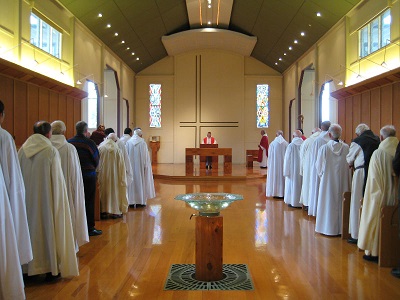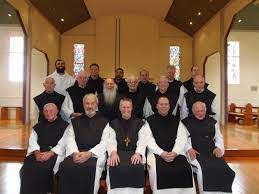Michael Casey OCSO, Tarawarra Abbey, Honorary Doctorate

Those who lived at Croydon Monastery from 1954 probably visited the Cisstercian Abbey at Yarra Glen, Tarrawarra (Cisterians of Strict Observane, the Trappists) – and met Michael Casey. His parents were a great support to the MSCs who worked in Park-Orchards- Warrendyte parish in the 1970s-1990s.
This is a long feature but worth reading to appreciate the contemplative vocation in today’s world. With thanks to Tim Brennan for sending it.

Michael Casey, 79, an Australian Cistercian monk of strict observance, is unanimously recognized as one of the most authoritative voices in contemporary Christian spirituality. His books, articles and conferences on the relevance of the Rule of St. Benedict, on the monastic tradition and on Bernard of Clairvaux, are spread throughout the world, and he is recognized by some as a spiritual heir of Thomas Merton. "L'Osservatore Romano" met him in Rome, where a few days ago he received a doctorate honoris causa in theology at the Pontifical Athenaeum Sant'Anselmo.
Father Michael, in the decisive passages of history the monastic presence has always had a decisive importance. However, in the epochal change that we are experiencing, monasticism today plays a fairly marginal role.

Certainly, it is true: think, for example, that a large part of the classical and humanistic culture that we study today in schools and universities has come down to us through the preservation and transmission carried out by generations of monks. But, you see, the monks guard the memory, the tradition. It is not the job of monks to change the world, nor, indeed, to change people. Monks are not required to be numerous, and even less to know how to impose a cultural hegemony. Rather, I think of monks as a small group of ordinary men and women who seek to live the Kingdom of God in simplicity. Nothing more than that. The Grace that monks can transmit to the world today comes from here: being ordinary, small, simple. The sanctity that monks seek in their simple life must be attractive, we do not have to convince or convert anyone. On the other hand, the Gospel does not tell us that we must change the world, but that we must be the salt of the earth. And to be salt of the earth, one does not need to be numerous. Look at Pope Francis how, alone, he manages to speak to the entire world, sowing - beyond both cultural and religious boundaries - words of fraternity and peace. That being "small" that I was telling you about then paradoxically becomes very big.
What does it mean to live in simplicity?

It basically means to enjoy the essentials. I emphasize "enjoy." It is not enough to live soberly. It is necessary to know how to enjoy and rejoice in this sobriety. The monk must live the joy of simplicity, and it is precisely this joy that exerts an attractive force in those who come into contact with the monastery. Once a gentleman who had come to visit us said to me at the end of the day: "I, Father, am not religious, but if I found myself becoming a believer, and had to choose a religion, I would choose yours: I mean I would choose your way of life, because you all seem happy with your essential life. You can feel something in the air here with you." And this attraction is exerted through individual person-to-person contact, without any convincing. Without blowing trumpets. Here, monks are the ones who don't blow trumpets. This is nothing new: it has always been so in the history of monasticism. This is why the Rule places hospitality among the characteristic traits of monastic life. And we too are nourished by these encounters, without any sense of superiority. It is not by chance that Benedict tells us that we must always ask ourselves whether that unexpected guest has not been sent on purpose by the Lord to instruct us or even to correct us.
This also implies a good dose of humility.
This certainly does. The monk is either humble or he is not. A humility that is not limited to the relational dimension, but is a total lifestyle. A humility that must be built in poverty. Monks (re)build humility every day; they do not build monasteries.
How does one become a monk?
There is something that sticks in your heart. Something that you might not have felt until the day before. A feeling inside something. You don't decide to become a monk, you are a monk; and you are one even before being recognized as such. Even though many years have passed, I remember my vocation well. I was young, but I didn't aspire to "do" anything in my life, rather I already felt that I "was" something, but I didn't know what. Then one Sunday my family and I visited a monastery and I immediately understood that there was that "something". Not the external aspects, the appearances, but that "air" that I was saying before can be felt even by a non-believer. You see, the Spirit is not something you learn but something you take in. You just have to exercise your senses to receive it."

For prospective visitors, the Guest House
Institutional monasticism seems to be in crisis. But new forms of cenobitic life are springing up here and there.
Well, you see, on the question of numbers, I have already answered that the monastic witness in the world does not depend on the number of monks and monasteries. I can only add that I notice that monastic life suffers when the monks are burdened with additional tasks to those prescribed by the rule, such as the management of schools, parishes, etc... With regard to the new foundations of modern inspiration, I limit myself to observing that often, even in the face of beautiful intuitions, they do not survive the founder.

In the case of the Cistercians, with their nine centuries of history, strength comes - along with their own style of life and prayer - from a founding literary tradition (Bernard, Aelred, etc.) that maintains a marked character of relevance. There are three cornerstones of our lifestyle that characterize us: the process of filiation of new foundations, the constant practice of visitations, and the centrality of decision-making in the general chapter. The balance between the autonomy of the individual monastery and the general direction of the charism is the hallmark of the Cistercian experience; the autonomy of the monastery when it is well interpreted is a good thing, but when it is not, it can be lethal.
But isn't the spiritual witness of the monks out of time? Does it not remain hidden from the hectic contemporary world?
You see, it is precisely the frenzy of today's world that generates a great, and often unfulfilled, demand for spirituality. However, we are not always able to satisfy this demand, which then finds easier answers elsewhere. Answers - I am also thinking of oriental philosophies - that concede more to the individualistic dimension that seems to dominate our time. People often perceive Christian spirituality as "imposed" and so they construct a self-made religion. I think that a certain insistence on the moral aspects of our belief (for example, on sexual morality) has ended up generating the perception of religion as an essentially normative fact, debasing the greatness and beauty of the kerygma. We must respond to these individualistic escapes by emphasizing the sense of community, because an authentic spirituality is nourished essentially by being in communion. Those who come to visit us in the monastery are attracted first of all by our living together.
The occasion of this recognition of the Anselmianum Athenaeum is also the occasion for a review of his life.
Look, I do not think I am a spiritual authority, my words - which are recognized as words of wisdom - are not mine, because I am my community. I simply think I am a man of tradition, I have always been: I have dedicated my whole life to the preservation and transmission of memory, of tradition. This is what monks have always done in their history. Looking to the past to embark on the future.
What is tradition?
As Pope Francis says, tradition is not a museum. Tradition also changes, and is constantly reforming itself. I like to say that "tradition" is a verb, not a noun. Think for example of the liturgy, which has been repeated for centuries, and for centuries has been a source of new life. We look to tradition when we are thirsty for new life. And I am still very thirsty.

di ROBERTO CETERA
